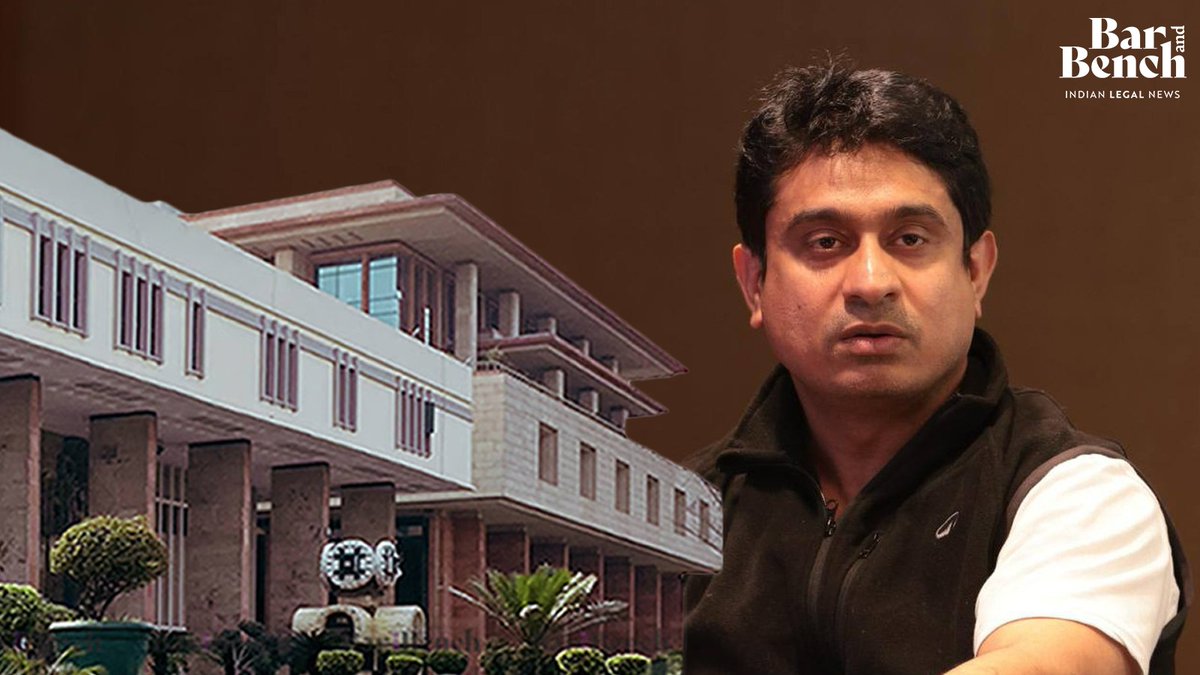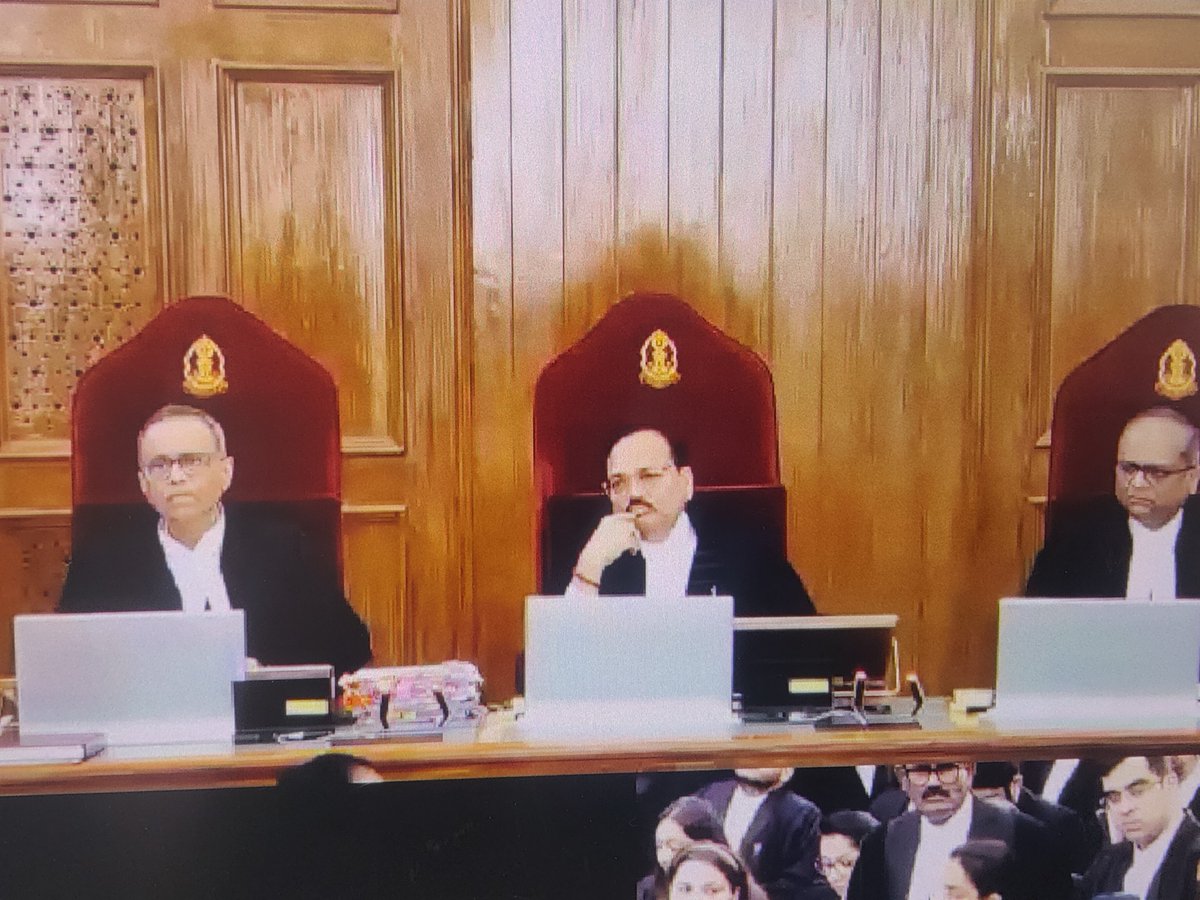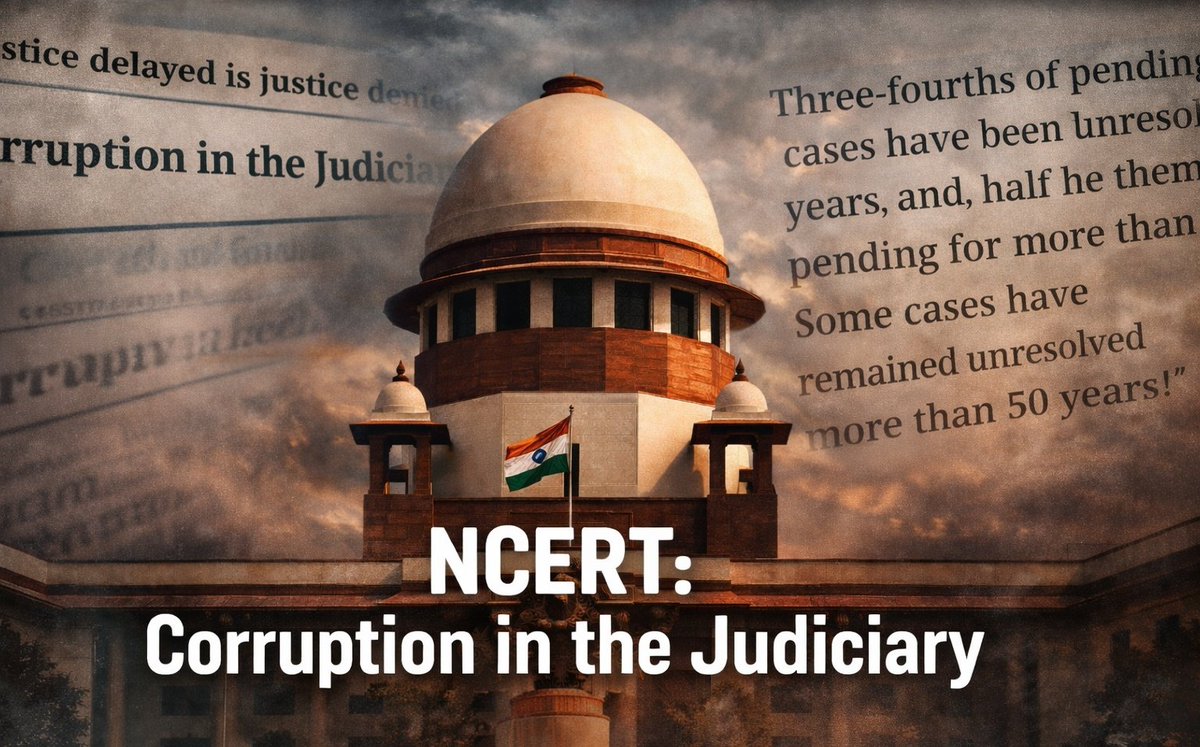CHALLENGE TO TRIBUNAL RULES OF 2020:
#SupremeCourt today is scheduled to resume hearing on the petition filed by Madras Bar Association challenging the Tribunal Rules of 2020 on the grounds that the Rules violate principles of Independence of Judiciary and Separation of Powers.
#SupremeCourt today is scheduled to resume hearing on the petition filed by Madras Bar Association challenging the Tribunal Rules of 2020 on the grounds that the Rules violate principles of Independence of Judiciary and Separation of Powers.

Three Judge Bench of Justices L Nageswara Rao, Hemant Gupta and S Ravindra Bhat begins the hearing in the case.
ASG Balbir Singh resumes making his submissions.
SC hints that the hearings must be wrapped up today.
#SupremeCourt #TribunalRules
ASG Balbir Singh resumes making his submissions.
SC hints that the hearings must be wrapped up today.
#SupremeCourt #TribunalRules
(Singh has been dropped out of the VC call)
(Singh is reconnected)
Singh: I was on the issue of can law officers retain their licence to practice on being appointed.
#SupremeCourt #TribunalRules
Singh: I was on the issue of can law officers retain their licence to practice on being appointed.
#SupremeCourt #TribunalRules
Singh reads a judgment which highlights the role and difference between Public Prosecutors and APP and observes that these prosecutors do not cease to be legal practitioners or Advocates on being engaged by the Government.
Justice Hemant Gupta: So by virtue of this Judgment, ILS has members of two kinds - those who practice in court and those who don't. Those who practice in court, will be treated as Advocates.
Justice L Nageswara Rao: According to Deepak Agrawal case, those who discharge the duty of appearing before the Court will be treated as Advocate.
Singh: A person may have had a practice and then while applying to be a judicial member may be member of ILS at the time but not a practising lawyer.
The requirement of expertise is in relation of Advocates, not for ILS.
The requirement of expertise is in relation of Advocates, not for ILS.
Justice Bhat: Is it not unfair that for a lawyer, it is required to have experience of appearing before the ITAT but for an ILS member it is not so.
Singh: There have been instances when a member of ILS was appointed as judicial member and was elevated to the Gujarat HC.
Singh: There have been instances when a member of ILS was appointed as judicial member and was elevated to the Gujarat HC.
Justice Rao: To argue that members of the ILS should be considered for judicial appointment, you will have to argue against decisions of two Constitution Benches. How do you get over that?
#SupremeCourt
#SupremeCourt
(Singh refers to the provision of Search cum Selection Committee to appoint judicial members)
Justice Rao: But the decision in Madras Bar Association says that ILS members cannot be appointed as judicial members of Tribunals.
Justice Rao: But the decision in Madras Bar Association says that ILS members cannot be appointed as judicial members of Tribunals.
(Singh now reads from the Madras Bar Association Judgment which says that only Judges or lawyers can be appointed as judicial members of NCLT and NCLAT)
Singh: The test is that of judicial independence. My humble submission is that the eligibility must be left to the Search and Selection Committee.
#SupremeCourt #TribunalRules
#SupremeCourt #TribunalRules
Singh: The aspect of superintendence is still open since Justice Chandrachud's judgement is silent on that.
(Singh concludes his arguments. ASG Sav Raju to make submissions now)
Raju argues in an application relating to CESTAT.
Raju: Prior to 2017, recruitments were governed by CESTAT rules. Relevant rule pertains to age kf superannuation.
Raju: Prior to 2017, recruitments were governed by CESTAT rules. Relevant rule pertains to age kf superannuation.
Raju: S.184 gives powers to the Central government to make Rules regarding apointments and recruitments and removal.
Raju: Central government's power is qualified by two things that there is an outer limit of five years and for President age cap is 70 and others 67.
Here applicant is saying she should be in service after ceiling of 5 years because she's below the prescribed age.
Here applicant is saying she should be in service after ceiling of 5 years because she's below the prescribed age.
Raju: Combined reading of Sections 183 and 184 would say that te Rules may be made applicable from an earlier date.
The legislature would have said that the Rules would apply from the date of notification if they intended for them to be prospective.
The legislature would have said that the Rules would apply from the date of notification if they intended for them to be prospective.
Raju: But the statute says that the rules can be made applicable from a previous date.
Justice Rao: But the Rules (of 2017) have been struck down now.
Raju: For different reasons but. Even the new rules would be applicable according to S.184 in exercise of power under it.
Justice Rao: But the Rules (of 2017) have been struck down now.
Raju: For different reasons but. Even the new rules would be applicable according to S.184 in exercise of power under it.
(Judges are having a discussion amongst themselves)
Raju: So I need not go into the judgment because the statute itself shows that the intent of the legislature was to make the Rules applicable from a previous date.
#SupremeCourt #TribunalRules
#SupremeCourt #TribunalRules
Raju is arguing on the merits of the MA, says that assuming that there are no Rules, neither of 2017 nor of 2020, then the Statute would prevail and therefore there is no question of extension of her tenure beyond five years which is the upper ceiling.
Senior Advocate Arvind Datar for Madras Bar Association to begin his rejoinder arguments now.
Datar: On tenure of members, it was asked what is the logic behind four years.
SC asks AG if he is agreeable to five years.
SC: Please consider this, statutes suggest 5 years so why don't you consider 5 years in light of this. Think about it and let us know next time.
SC asks AG if he is agreeable to five years.
SC: Please consider this, statutes suggest 5 years so why don't you consider 5 years in light of this. Think about it and let us know next time.
Datar: Now the justification is that there is a possibility and provision for reappointment that is why four years.
Justice Rao: We have heard AG on this, he suggested that with 20-25 years experience for lawyers, they become eligible at around 48 and then there is reappointment
Justice Rao: We have heard AG on this, he suggested that with 20-25 years experience for lawyers, they become eligible at around 48 and then there is reappointment
Datar: What hurts is that when the Constitution Bench has said something then what is the point of making it four years.
I'm glad that now AG has agreed to consider this aspect.
But if it is made 5 then that is a concession I have nothing to say about.
I'm glad that now AG has agreed to consider this aspect.
But if it is made 5 then that is a concession I have nothing to say about.
AG: My statement may be recorded on behalf of the government that there will be reappointment.
Datar: It must be 5+5 years then
Justice Rao: Let him get instructions on that.
Datar: It must be 5+5 years then
Justice Rao: Let him get instructions on that.
Datar: There is nothing in the Finance Act which enables rules to be made retrospectively in contrast to S.164(3) of the GST Act which gives specific powers to make Rules with Restrospective effect.
In the absence of such provision, rules can't be made retrospectively.
In the absence of such provision, rules can't be made retrospectively.
Datar: I must thank the AG that Advocates with 25 years can be appointed.
The logic seems to be that with 25 yrs experience, Advocate will be at around 48 yers of age.
But here it is said 25 years of substantial expy in the specific domain.
The logic seems to be that with 25 yrs experience, Advocate will be at around 48 yers of age.
But here it is said 25 years of substantial expy in the specific domain.
Datar: This also reduces the number of eligible people.
My suggestion is that to attract more number of lawyers of even CAs and to expand the pool of eligible people the requirement may be 10-15 years of experience.
My suggestion is that to attract more number of lawyers of even CAs and to expand the pool of eligible people the requirement may be 10-15 years of experience.
Datar: I'd submit on the behalf of the Bar that an experience of 25 years would disincetivize the lawyers to leave their practice to join the Tribunal for 4 years whereas if the experience is fixed for 15 years, it will attract more applicants
Datar: The Substantial practice requirement maybe reworded from before that specific Tribunal to experience in matters relating to the domain.
(Datar gives example that "before NCLT" may be reworded to "experience in matters of company law")
(Datar gives example that "before NCLT" may be reworded to "experience in matters of company law")
(Datar is about to touch upon AFT)
SC: AG has already told us that Armed Forces don't want civilian heading the Tribunal.
Datar: Very well but what was pointed out to me was serious issues like Court martial is hardly 3-4% of the matters, most are related to service conditions.
SC: AG has already told us that Armed Forces don't want civilian heading the Tribunal.
Datar: Very well but what was pointed out to me was serious issues like Court martial is hardly 3-4% of the matters, most are related to service conditions.
Datar: I was told that the members of the ILS don't often appear before the Court but they're responsible for instructing the panel lawyers, law officers etc.
SC: Instructing would also be included in practising before the Court?
SC: Instructing would also be included in practising before the Court?
(Datar refers to the point of requirement of substantial domain knowledge to counter that ILS members can be appointed as judicial members in Tribunals.
He adds that in Madras Bar Association Judgment, SC said they can be appointed as technical members not Judicial)
He adds that in Madras Bar Association Judgment, SC said they can be appointed as technical members not Judicial)
Hearing for the day draws to a close.
Justice Rao informs the Counsel that the Bench combinations from the next week onwards are likely to change and the case may not be taken up immediately now.
Justice Rao says Counsel will be informed about the next date of hearing.
Justice Rao informs the Counsel that the Bench combinations from the next week onwards are likely to change and the case may not be taken up immediately now.
Justice Rao says Counsel will be informed about the next date of hearing.
• • •
Missing some Tweet in this thread? You can try to
force a refresh










